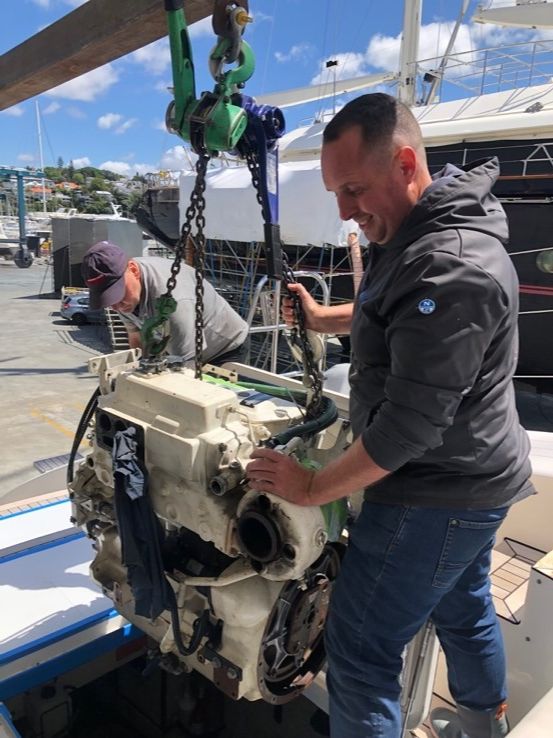We get so much from being in the water, we love to be out feeling the ocean breeze and interacting with other local sailors, and of course, the marine wildlife. However, owing to our collective lifestyle as humans, we are causing a great deal of damage , and at a rate that nature cannot recover quickly enough. In this article, I discuss simple and practical ways to protect our planet by becoming sailing ocean ambassadors.
OCEAN’S HEALTH
The first step towards becoming a more environmentally responsible sailor is identifying the boating issues that harm our oceans, such as fuel and oil spillages, garbage/plastic pollution, engine gas emissions, chemical pollution from cleaning products and paint, just to name a few. Marine invertebrates, are very sensitive to harsh chemicals, nanoplastics, and heavy metals, such as copper, used in boat paints. Many studies have observed negative effects of anthropogenic chemicals on invertebrate communities.
The marine food web starts at the base with the plancton and the algae: they are eaten by small fish and crustaceans, which are eaten by fish, smaller sharks, baleen whales, filter feeders, etc. As we continue our way up the food web. It is important to keep in mind that if we pollute our oceans, the pollution will make its way up the food web and eventually end up in our bodies. However, there is a lot we can do to become greener sailors, if we take small steps towards creating a difference,we will see a great improvements in the overall health of our beloved oceans.
ECO FRIENDLY PRODUCTS
Our power lies in the decisions we make as consumers. Below, I will leave useful links to some of the biodegradable products that are available, that avoid harsh chemicals. When buying cleaning products, choose eco-friendly boat cleaning solutions, preferably made from local products. For example, there are eco boat soap and wax, to keep our vessel squeaky clean. Also when having to clean the deck and bring the teak back to life, there are eco-friendly deck and teak cleaner options available that use pH neutral chemicals to protect our oceans.
Similarly, think about buying eco-friendly toiletries, such as shampoo, soap, moisturizers, etc. because is important to keep in mind that everything that you flush down the sink will eventually end up in the ocean. When we are out sailing and in the sun, use a reef friendly sun cream: corals will appreciate this!
WASTE
Maintaining hydration during sailing and boat-related tasks is crucial. Opt for stainless-steel water bottles to steer clear of purchasing plastic ones. Prioritize local food consumption, and if you indulge in fishing, make a point to consume all your catch, minimizing food waste and preventing litter overboard. Minimize the use of plastic by choosing reusable alternatives like cloth bags, stainless steel or glass containers, and environmentally friendly utensils.
Another good step to implement in our sailing adventures is to choose recycled or second-hand items . If you are going to a cold weather place or embarking on an open ocean crossing, acquiring second-hand coats, jumpers, flees, bennies, and blankets is always a great idea. You can always borrow things from fellow eco sailors!
CARBON FOOTPRINT
Take as much advantage of the natural elements, as possible: use the boat’s motor sparingly by sailing as much as you can. This is an effective way to reduce the carbon footprint. Moreover, by minimising the use of the motor, you rely on renewable energy and contribute to a cleaner and sustainable boating environment. Another way to reduce our carbon footprint is to use paddle boards, kayaks or canoes to get onshore from the boat. Instead of usinga tender/dinghy/zodiac with an outboard engine to get onshore, try using your strength and get some exercise out of it while protecting our oceans.
WILDLIFE
From a marine biologist’s perspective, respect wildlife and enjoy watching dolphins, whales, and sharks from afar. Do not harass the animals that you encounter, and if you find yourself surrounded by these beautiful creatures, turn the motor off as the sound is very loud for them, and the propellers pose a threat to their skin. Do not interfere with their natural behavior; avoid feeding wildlife, as it disrupts their natural diet and can have negative effects on their health. Consider participating in local citizen science projects or helping with ongoing scientific investigations, so you can help protect marine wildlife populations.
Join oceans and beach clean-ups!
If you are already a proud ocean ambassador and have adopted the above-mentioned habits, you could consider taking bigger steps to a greener boating industry. Switching to renewable energy considers sustainable technology, such as stand-alone solar panels, wind generators, and water generators. Reduce fuel use by upgrading engines to lower emissions. Dispose of sewage and untreated water safely, and adopt a regular maintenance routine to prevent leakage into the water. In the photo below, our captain Sam is taking the engine out to service it and make sure it runs smoothly.

Whether you are chartering a boat, joining a sailing trip or taking out your own vessel, by adopting these few simple habits and making conscious choices, you too can become a responsible sailor, and an ocean ambassador.
By Camila Arnés-Urgellés
Marine Ecologist
Helpful links
https://savingtosail.com/eco-friendly-products-for-boats/
https://www.superyachtcontent.com/miscellaneous/the-top-friendly-eco-products-to-have-on-board/
https://www.discoverboating.com/resources/eco-friendly-boats-and-gear




